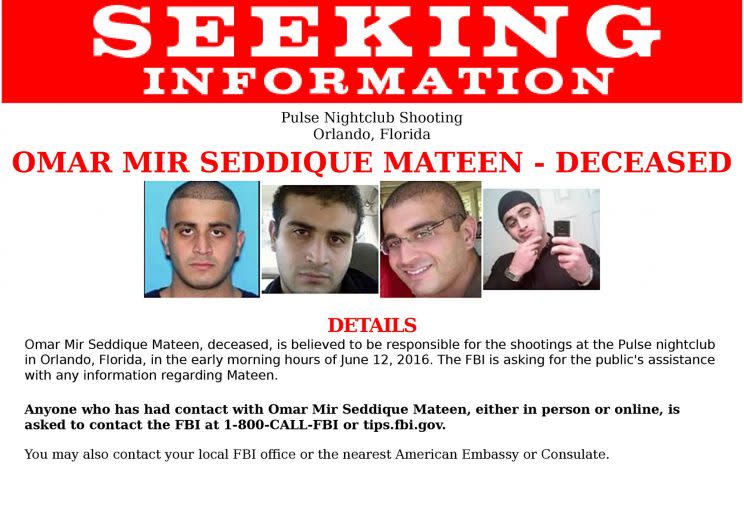Orlando gunman Omar Mateen watched ISIS beheading videos, source says

FORT PIERCE, Fla. — Omar Mateen watched Islamic State terrorist videos — including some showing the brutal beheadings of hostages — and talked to co-workers about them, according to congressional sources briefed by the FBI on the investigation into the massacre at the Pulse nightclub in Orlando.
The discovery that Mateen, who was born in New York to Afghani parents, watched Islamic State videos was one piece of the evidence behind FBI Director James Comey’s statement on Monday that the perpetrator of the nightclub massacre had undergone “radicalization.”
But other evidence emerging in the investigation also points to a troubled man who was experiencing psychological problems even as he expressed solidarity with Islamic terror groups.
Mateen, a licensed security guard for nearly seven years, also became addicted to steroids that he took to enhance his ability in weightlifting, which was one of his hobbies. He talked to colleagues about how he was able to “beat” his addiction to the drugs.
The FBI is also talking to witnesses who say Mateen had previously attended the gay nightclub, but the bureau has so far reached no conclusions about the visits, including whether he may have been seeking to meet gay men or might have been casing the club for his future attacks.
“He was clearly confused,” said one congressional source who attended a briefing with Comey for House members. But it is still far from clear to what extent Mateen was influenced by radical postings and videos on the Internet.
One trail the bureau is pursuing is Mateen’s two trips to Saudi Arabia in March of 2011 and March 2012. But how important they were in Mateen’s radicalization is also unclear; both trips were during the time period of Haj pilgrimages and may only be evidence of his Islamic faith, said sources familiar with the investigation.
Mateen, 29, died early Sunday during a shootout with police after opening fire on the crowded gay nightclub near downtown Orlando. One hundred people were shot, 49 of them fatally.
“I would call it a hate crime. I would call it terrorism. It’s both,” Orlando FBI Special Agent Ron Hopper said Wednesday when pressed about what motivated the attack.
The FBI published a poster on Wednesday seeking more information about Mateen, who lived in Fort Pierce with his wife and young son.
“We need your help in developing the most complete picture of what the shooter did and why he did it,” Hopper said.
The shooting, the deadliest mass shooting in U.S. history, comes after federal investigators questioned Mateen in 2013 and 2014 for possible ties to radical Islamists. The FBI dropped Mateen from a terror watch list after no “derogatory” information was found, the agency said.
Information regarding his time on the terror watch list apparently never reached Florida authorities who last August renewed Mateen’s license to work as an armed security guard.
“He successfully completed the application, had a criminal background check and there is nothing in that record that would have disqualified this individual who is a U.S. citizen who had a clean criminal record … from receiving those licenses,” Florida Agriculture Commissioner Adam Putnam told reporters on Monday.
The Florida Department of Agriculture and Consumer Protection, the agency that licenses security guards, turned over more than 60 pages of records and 10 photos from Mateen’s original 2007 application and subsequent renewals. The office released the documents in response to public records requests filed by Yahoo News and other media outlets.
Mateen held both a “D” security guard license, and a “G” security guard firearms license, which enabled him to carry two guns specified by the state at any single time.
Investigators have said Mateen was firing an assault-style rifle and a Glock handgun — neither of which he was licensed to carry at work — when he ambushed the crowded Pulse nightclub early Sunday. The handgun Mateen used at work was found in his car outside the club.
Florida’s application for armed security guards asks about mental illness and criminal history, but not whether the applicant was ever investigated for terrorist ties. Mateen’s ex-wife Sitora Yusufiy has told reporters that the shooter may have been mentally ill.
According to the state applications, Mateen passed a physical with a Fort Pierce general practitioner and a written mental exam and evaluation with a South Miami psychologist in September 2007.
Mateen has been employed with G4S Secure Solutions (formerly Wackenhut) since 2007. His assignment at the time of the shooting was working the security checkpoint at an upscale golf subdivision in Port Saint Lucie.
(Jason Sickles reported from Fort Pierce, Michael Isikoff from New York City.)

